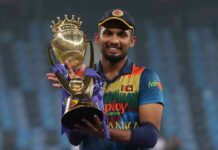They came from all around Harare. From the high-density areas of Highfield in the southwest and Mabvuku in the east, to the larney, leafy suburb of Borrowdale. As the winter sun faded into a golden light and Zimbabwe edged closer to a most implausible victory, they sang the national anthem, cheered every run and bounced to the DJ’s beats.
They created an atmosphere uniquely Zimbabwean and reminded anyone who was watching – perhaps even themselves – why this remains one of the great countries of the world.
Cricket in Zimbabwe has never been far from reflecting the state of the country. Just as Zimbabwe is politically and economically broken, run by a small elite that looks after their own interests, so it is with cricket.
But no country I’ve been to have people such as Zimbabwe’s, people who refuse to give up on living. Supporters here have had little to celebrate of late, but still they turned out. So it is too with Zimbabwe’s cricketers, who have endured all sorts of difficulties but still carried enough life and enthusiasm for the game within themselves to rise from the ashes like a phoenix and pull off one of cricket’s great upsets.
The three-wicket win over Australia on Sunday (August 31) equalled Zimbabwe’s original great upset – against the same opposition in their first ever One-Day International in the 1983 World Cup – as well as the one over South Africa in the 1999 World Cup and Australia in the 2007 World Twenty20.
“There have been many other occasions where Zimbabwe has pulled off these odd wins, and I think it ranks as one of those times,” Stephen Mangongo, the coach, said afterwards. “There are a lot of positive Zimbabweans who love sport. I’m sure you heard all the singing and the joyous, momentous occasion when Zimbabwe won. As sports loving people, I’m sure they are happy that their team managed to beat the No. 1 team in the world.”
If anything it was an understatement, but Mangongo was clearly in an understated mood. His methods have been unpopular among his players and he has received no shortage of criticism in the press and on social media, so he could easily have used the occasion to show two fingers to his detractors. Instead, asked how he felt, he said, “It’s another game. There’s another game coming on Thursday. It’s just my job. It doesn’t mean anything.”
The lack of emotion could hardly have been more different from that being shown at the after-party outside. Surely, though, he felt vindicated? “I don’t feel vindicated because I had nothing to prove. I was just doing my job,” he said.
Mangongo and his fellow selectors certainly deserved some of the credit, having softened their previously hardcore stance over the past week. Zimbabwe made just one change to the side in spite of the disappointment against South Africa two days ago, and fielded something very close to their best side. The reward was a performance that was about as good as Zimbabwe can offer.
On Saturday night, the Australian camp held a quiz in which the 1983 encounter was the topic of one of the questions. Not many knew anything about it, but they’re unlikely to forget this one.
“I think credit needs to go to Zimbabwe – their spinners bowled really well to us and they used the conditions really well,” said Michael Clarke. “I think they outplayed us and they certainly deserved to win today.”
Nobody could argue with that assessment. After grabbing early wickets, Zimbabwe’s four spinners never released the pressure on Australia and went on to take six wickets for 117 runs in 36 overs. Australia got hold of the seamers in the final overs and enjoyed four dropped catches, but the damage had already been done.
At the halfway stage, it was clear that Australia had a battle on their hands. Although Nathan Lyon had been brought back into the side, with Clarke crocked and unable to bowl there were only going to be ten overs of truly threatening spin on a pitch that provided even more turn than the ones seen in the first three games of the tournament.
Lyon took four wickets as Zimbabwe fell to 106 for 5, but the Zimbabwean middle order recognised the limited threat that the Australian attack held and stuck in there. Once Lyon had finished his spell – a superb ten overs on the trot with four men around the bat – the hosts slowly came out of their shell and Elton Chigumbura and Prosper Utseya produced as composed a partnership as you could hope for in the circumstances. Instead it was Australia that fell apart, conceding 18 wides and gifting extra runs through some shoddy ground fielding.
While the decision to leave out Steve Smith looked like an error in judgement by Australia’s selectors, the resting of Mitchell Johnson was a clear case of underestimating the opposition. Short on spin and without their chief strike bowler, Australia paid a heavy price.
“Forget the opposition, I think we played some average cricket at best throughout the whole game,” said Clarke. “I think our general fielding was poor. Our execution with the ball was okay but had to be better when we only had 200-odd on the board. And our batting, we continually talk about facing spin bowling as an Australian team. It seems to be an area we continue to struggle in and today’s another example of that.”
With Clarke flying home, Australia will have more awkward moments in this tournament, even if their thumping of Zimbabwe in the first round has more or less secured their place in Saturday’s final. They would need to lose to South Africa and then see Zimbabwe beat the South Africans on Thursday to miss out.
As Zimbabweans wake up with heavy hangovers on Monday morning, they will allow themselves to dream that such a series of events could occur. After all, they are the masters of living life to the full – whatever the circumstances – and what is the point of living if you don’t allow yourself to dream a little.






















